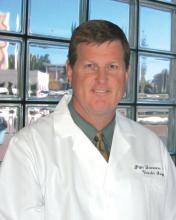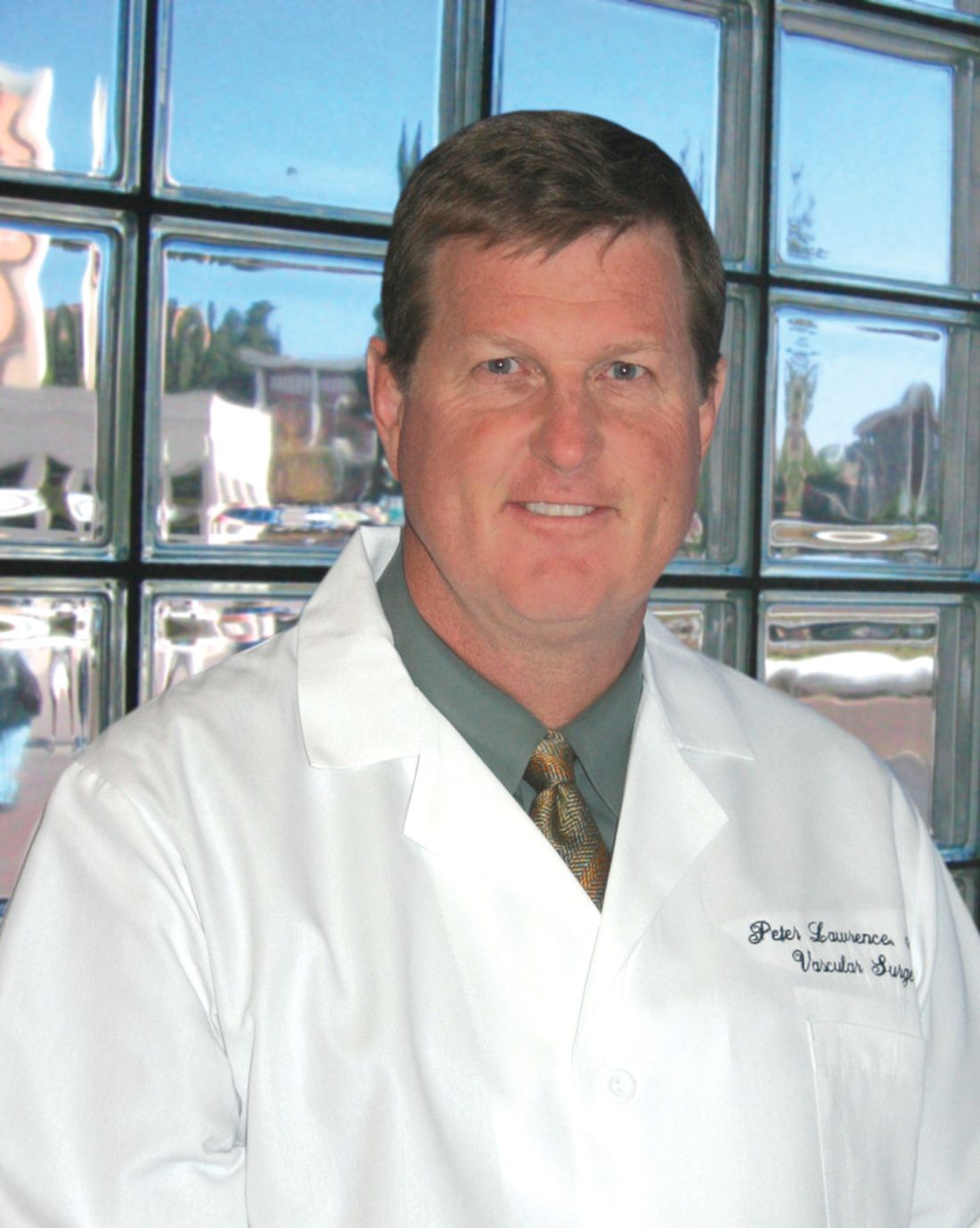User login
An array of new technologies to treat vascular diseases will be the focus of “New Developments in Vascular Laparoscopy, Robotics and Simulation” on Tuesday morning.
“New technology allows less-invasive procedures to be performed for more complex vascular diseases,” said co-moderator Dr. Peter F. Lawrence, MD, professor of surgery at the David Geffen School of Medicine at UCLA and chief of vascular surgery at Gonda Vascular Center in Los Angeles. “It is part of an inexorable march toward using minimally invasive procedures on most vascular diseases, as the initial procedure. The session will expand the options and tools of vascular surgeons who are interested in providing cutting-edge technology to their patients,” he continued.
“Two talks that should be of particular interest will discuss the current role of robotics in vascular disease management,” said Dr. Lawrence. Dr. Joseph J. Ricotta, II of the Charles E. Schmidt College of Medicine at Florida Atlantic University will go over the present status of endovascular robotics, as well as its prospects for the future. Dr. Willhem Wisselink of VU University and VU University Medical Center in Amsterdam will focus on the future of robotics in vascular surgery and endovascular procedures. His presentation will include a discussion of nanobots.
The last presentation will cover advances in robotic laparoscopic treatment of abdominal aortic aneurysms (AAAs) and other lesions by Dr. Fabien Thaveau of the Medical School of Strasbourg and Strasbourg University Hospital in France. His talk will touch on the value of the Gore Hybrid Vascular Graft in re-vascularizing branch arteries.
Dr. Lawrence cited the importance of simulation in the training of all vascular specialists. “This is the way we can train with new devices before they are used on patients,” he explained. “Simulation has become very sophisticated and now provides an experience very similar to the real-world operating room. It allows for practice until the device and technique are mastered and perfected, prior to use on patients. And, it reduces the risk to patients as new devices are introduced, as well as opens new technology to public use.”
Attendees will leave the session with a better understanding of less-invasive techniques for vascular procedures. “Robotics are an important link in the progression toward using minimally invasive devices for initial and primary vascular diseases,” Dr. Lawrence concluded.
Session 11:
New Development in Vascular Laparoscopy, Robotics and Simulation
9:26 a.m. – 10:19 a.m.
Grand Ballroom West, 3rd Floor
An array of new technologies to treat vascular diseases will be the focus of “New Developments in Vascular Laparoscopy, Robotics and Simulation” on Tuesday morning.
“New technology allows less-invasive procedures to be performed for more complex vascular diseases,” said co-moderator Dr. Peter F. Lawrence, MD, professor of surgery at the David Geffen School of Medicine at UCLA and chief of vascular surgery at Gonda Vascular Center in Los Angeles. “It is part of an inexorable march toward using minimally invasive procedures on most vascular diseases, as the initial procedure. The session will expand the options and tools of vascular surgeons who are interested in providing cutting-edge technology to their patients,” he continued.
“Two talks that should be of particular interest will discuss the current role of robotics in vascular disease management,” said Dr. Lawrence. Dr. Joseph J. Ricotta, II of the Charles E. Schmidt College of Medicine at Florida Atlantic University will go over the present status of endovascular robotics, as well as its prospects for the future. Dr. Willhem Wisselink of VU University and VU University Medical Center in Amsterdam will focus on the future of robotics in vascular surgery and endovascular procedures. His presentation will include a discussion of nanobots.
The last presentation will cover advances in robotic laparoscopic treatment of abdominal aortic aneurysms (AAAs) and other lesions by Dr. Fabien Thaveau of the Medical School of Strasbourg and Strasbourg University Hospital in France. His talk will touch on the value of the Gore Hybrid Vascular Graft in re-vascularizing branch arteries.
Dr. Lawrence cited the importance of simulation in the training of all vascular specialists. “This is the way we can train with new devices before they are used on patients,” he explained. “Simulation has become very sophisticated and now provides an experience very similar to the real-world operating room. It allows for practice until the device and technique are mastered and perfected, prior to use on patients. And, it reduces the risk to patients as new devices are introduced, as well as opens new technology to public use.”
Attendees will leave the session with a better understanding of less-invasive techniques for vascular procedures. “Robotics are an important link in the progression toward using minimally invasive devices for initial and primary vascular diseases,” Dr. Lawrence concluded.
Session 11:
New Development in Vascular Laparoscopy, Robotics and Simulation
9:26 a.m. – 10:19 a.m.
Grand Ballroom West, 3rd Floor
An array of new technologies to treat vascular diseases will be the focus of “New Developments in Vascular Laparoscopy, Robotics and Simulation” on Tuesday morning.
“New technology allows less-invasive procedures to be performed for more complex vascular diseases,” said co-moderator Dr. Peter F. Lawrence, MD, professor of surgery at the David Geffen School of Medicine at UCLA and chief of vascular surgery at Gonda Vascular Center in Los Angeles. “It is part of an inexorable march toward using minimally invasive procedures on most vascular diseases, as the initial procedure. The session will expand the options and tools of vascular surgeons who are interested in providing cutting-edge technology to their patients,” he continued.
“Two talks that should be of particular interest will discuss the current role of robotics in vascular disease management,” said Dr. Lawrence. Dr. Joseph J. Ricotta, II of the Charles E. Schmidt College of Medicine at Florida Atlantic University will go over the present status of endovascular robotics, as well as its prospects for the future. Dr. Willhem Wisselink of VU University and VU University Medical Center in Amsterdam will focus on the future of robotics in vascular surgery and endovascular procedures. His presentation will include a discussion of nanobots.
The last presentation will cover advances in robotic laparoscopic treatment of abdominal aortic aneurysms (AAAs) and other lesions by Dr. Fabien Thaveau of the Medical School of Strasbourg and Strasbourg University Hospital in France. His talk will touch on the value of the Gore Hybrid Vascular Graft in re-vascularizing branch arteries.
Dr. Lawrence cited the importance of simulation in the training of all vascular specialists. “This is the way we can train with new devices before they are used on patients,” he explained. “Simulation has become very sophisticated and now provides an experience very similar to the real-world operating room. It allows for practice until the device and technique are mastered and perfected, prior to use on patients. And, it reduces the risk to patients as new devices are introduced, as well as opens new technology to public use.”
Attendees will leave the session with a better understanding of less-invasive techniques for vascular procedures. “Robotics are an important link in the progression toward using minimally invasive devices for initial and primary vascular diseases,” Dr. Lawrence concluded.
Session 11:
New Development in Vascular Laparoscopy, Robotics and Simulation
9:26 a.m. – 10:19 a.m.
Grand Ballroom West, 3rd Floor

